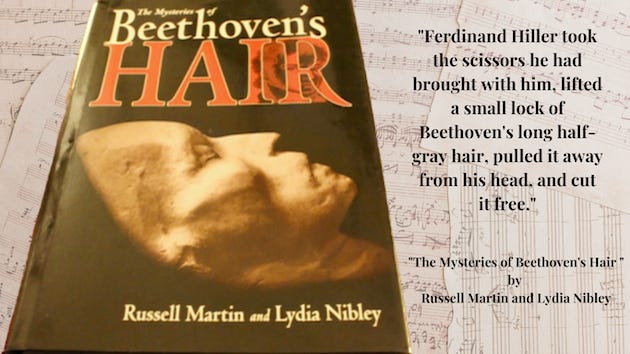A week of music ...
Quote of the week
“Mozart wrote for people
Beethoven wrote for humanity”
Jan Swafford
Hello,
This week’s newsletter will be filled with music, classical music. I have attended some excellent concerts with my favourite composer Ludwig van Beethoven. I will also attend a concert with Tchaikovsky’s 3rd and 5th Symphonies. I have ordered a relaxation seat so am eager to try it out. More on that next week
Beethoven festival in Lund
An annual event organised by Swedish, professional pianist Per Tengstrand. He lives in Princeton in the US, but visits Sweden from time to time to enlighten our part of the world with his fantastic piano play. He does not only play the piano, but provides various kind of information on the composer he is playing. It is always a pleasure to hear experts talk about their work, and this is no exception. Together with violinist Viktor Bergendal the two gave a fantastic performance of a part of the Kreutzer sonata.
The Kreutzer Sonata, No. 9
The Kreutzer Sonata, we were told, is a technically difficult piece to play. It is unusually long, 40 minutes and contains an emotional scope. It was originally dedicated to the violinist George Bridgetower (1778–1860), who played it on the premiere at the Augarten Theatre on 24 May 1803 . Bridgetower quickly read the sonata just before the concert started. He had never seen the notes before, and there had not been any time for a rehearsal. I asked Viktor Bergendal, the violinist, if he would have been able to play it, just like that. He laughed and said “no way”. One must also consider the notes scribbled by Beethoven, which must have been difficult to read. I gather Bridgetower was as good as his reputation.
It went seemingly well, but after the original performance, the two men fell out while out drinking. Bridgetower seems to have insulted the morals of a woman Beethoven cherished. Beethoven got very upset and removed the dedication. In stead he dedicated it to Rodolphe Kreutzer who was considered the finest violinist of the day. Unfortunately, he disliked the piece and refused to play it. Another sad happening in Beethoven’s rather tragic life.
On Saturday evening we were treated with Beethoven’s three last sonatas which are are blend of very powerful music and more light and happy tunes.
Ludwig van Beethoven
Beethoven was born 250 years ago, but is still popular today. In 2017, the chancellor of Germany, Angela Merkel used his 9th Symphony for the Group of 20 summit as “a hymn to humanity, peace, and international understanding”. The “Anthem of Europe” is an extract from the prelude “Ode to Joy”, the final movement of the 9th Symphony. In 1972 it was adopted by the Council of Europe as an anthem to represent Europe (adopted by the European Union in 1985). The purpose is, as Angela Merkel said, to honour shared European values, expressing the ideals of freedom, peace and solidarity. Friedrich Schiller wrote the poem “An die Freude” (“To Joy”) in 1785 as a “celebration of the brotherhood of man”. After his death, Beethoven used the words for the choral movement of the 9th Symphony.
The big questions is why Beethoven is still so popular, and seemingly modern? Why not one of the other great composers? Maybe he is seen as the idea of the creative genius. In spite of everything he had to fight against he reached the height of his art. In spite of the beginning of deafness from the age of 28, he went on to produce 722 works, including 9 symphonies, 35 piano sonatas and 16 string quartets. It is difficult today to imagine, that his greatest works were created in what he called “a terrifying void of silence”.
Beethoven’s personal struggles lasted a life time. We think of him as the tortured artist, a genius, a little bit mad and misunderstood in his own time. The constant health problems, and above all, his deafness, seem to, in spite of the situation, have lead him to compose wonderful music. “What I have in my heart must come out. That is why I compose”, he said. There was no way stopping him, and we hear this struggle in his music. Often very powerful and loud, then going into something softer, almost romantic.
Beethoven’s influence goes above the pure music. A revolutionary, a person who provoked his surroundings, a little bit of madness inside, a man overcoming so many obstacles to do what he loved. Maybe that is the answer to why he has become such a beloved figure. French dramatist Romain Rolland wrote regarding the 7th Symphony: “The work of an inebriated man indeed it was, but one intoxicated with poetry.” I think we can all agree.
This week
The Mysteries of Beethoven’s Hair
I reviewed this book by Russell Martin and Lydia Nibley back in 2018. The concerts has given me a good excuse to publish it again. A young musical student, attending the death bed of Beethoven, cut off a lock of his hair. The story in the book follows the lock of hair as it travels through history, to unexpectedly turn up in the 20th century. An amazing journey. You can read the review on The Content Reader.





